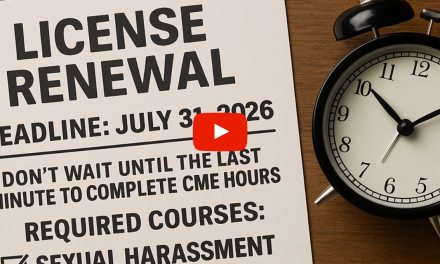
Avoiding a Medicare Audit

- Consultation should address family history, social history, medications and past health history. Evaluation and Management guidelines require that the code 99203 (most commonly used E/M code in chiropractic) requires the social history, family history, and past health history.
- An Initial Visit Report is to be produced in all Medicare cases. An “Initial Visit Report,” as outlined in the “Local Carrier Determination” (LCD) for Chiropractic, is required to be generated on every new case. Keep the report on file and send in if CMS asks for notes or you are asked for notes in any other review such as a CERT review..
- Box 14 (date treatment began) should be updated when appropriate. A box 14 date over two months old may start to look like maintenance care.
- Evaluation and Management (E/M) code level should be appropriate for the condition. A comprehensive E/M (99205) is rarely used in the chiropractic office. 99211 is called the “Nurses Code” and is not typically for the doctor.
- Outcomes Assessment Tests measure Functional Impairment. It is the standard of care to use them to objectively show function loss of ADL. If you refer to Activities of Daily Living impairment, then the only objective manner to evaluate ADL impairment is through Outcomes Assessment tests.
- Re-examine the patient under active care every 10-12 visits or 30 days. Update your treatment goals, frequency and plan after the examination. The patient must show progress and need for further care. This is the manner to accomplish this objective.
- SOAP notes should tell the story of “What is going on?” How is the patient improving? Why do they need care? Make sure the questions are answered every encounter.
- PART proves a subluxation. In Medicare make sure you document PART for every visit, every region that you are treating.
- Diagnosis determines treatment. Cervicalgia (neck pain) and Lumbalgia (low back pain) is a short-term diagnosis and should be avoided.
- Have a Compliance Plan and Audit done by a Certified Medical Compliance Specialist (MCS-P). The Patient Protection and Affordable Care Act (National Health Care Reform Law), signed into law March 23, 2010, has now mandated a compliance plan. The OIG stated that a compliance plan will be used as “a mitigating factor” against fines and jail time.
In the new healthcare bill, Patient Protection and Affordable Care Act (Public Law 111-148) signed into law by President Obama, one of the many changes to our industry includes the requirement found under “Enrollment Requirements under Medicare, Medicaid, and CHIP:
Paragraph 7950 – Section 6401 – Provider Screening and Other Enrollment Requirements Under Medicare, Medicaid and CHIP.
Medicare – Section 1866(j) of the Social Security Act (42USC1395cc(j) is amended
In paragraph (1)(a)….”Such process shall include screening of providers and suppliers in accordance with paragraph (2), a provisional period of enhanced oversight in accordance with paragraph (3), disclosure requirements in accordance with paragraph (4), the imposition of temporary enrollment moratoria in accordance with paragraph (5), AND THE ESTABLISHMENT OF COMPLIANCE PROGRAMS IN ACCORDANCE WITH PARAGRAPH (6)”.



















